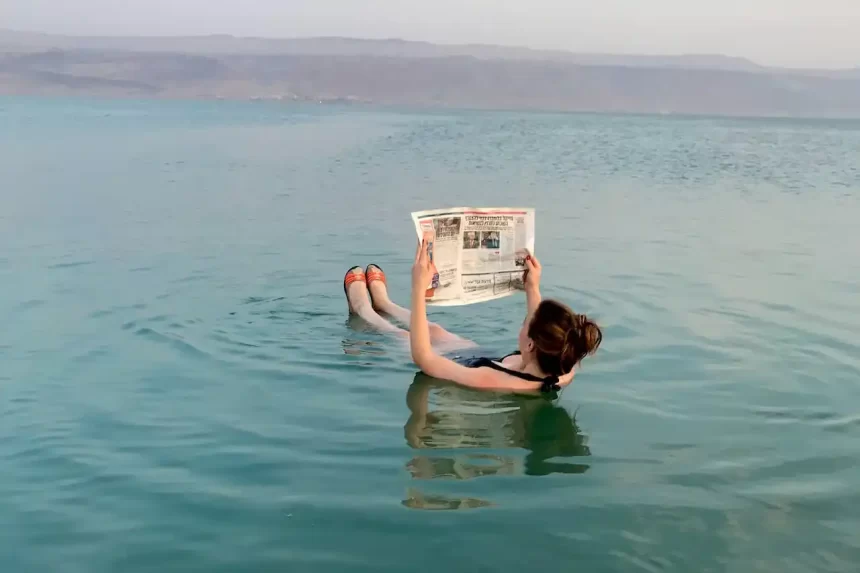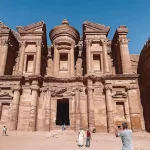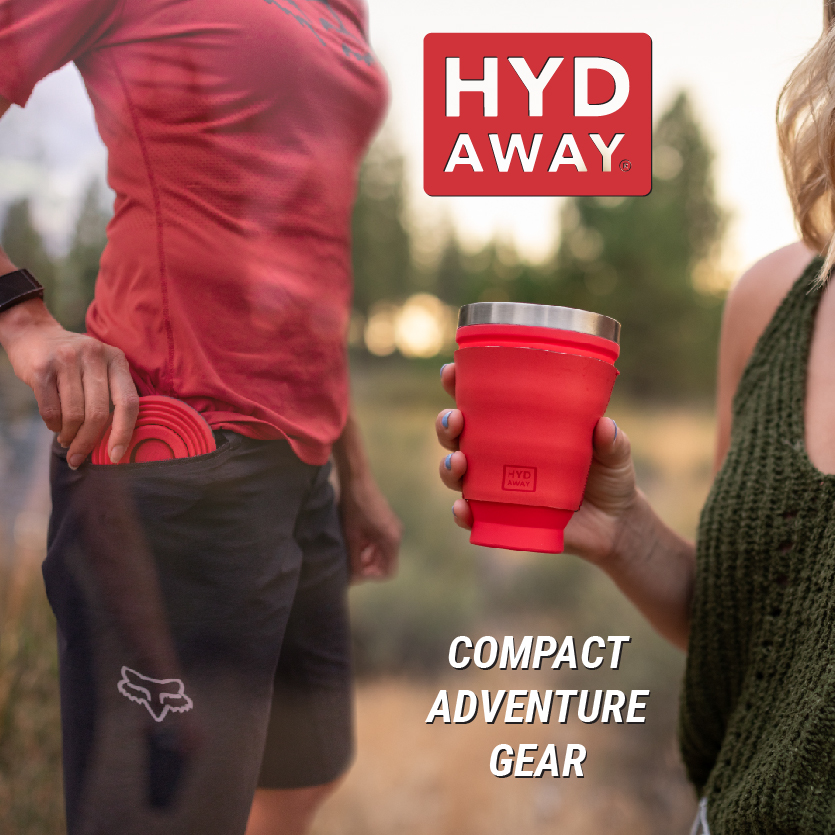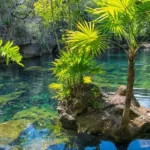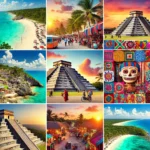Exploring the Dead Sea
The Dead Sea, a salt lake bordered by Jordan to the east and Israel and the West Bank to the west, is a renowned destination for travelers seeking a unique experience. On the Jordanian side, the main access point is from the capital, Amman, which is roughly an hour’s drive to the northern beaches of the Dead Sea. This side is known for its luxurious resorts, public beaches like Amman Beach, and the historical site of Lot’s Cave. Visitors often enjoy the less crowded and more serene atmosphere here.
On the Israeli side, the Dead Sea is easily reachable from major cities like Jerusalem or Tel Aviv. The main areas of interest include Ein Bokek and Neve Zohar, known for their well-developed tourist facilities, including a range of hotels from budget to luxury. This side also offers access to several natural reserves and historical sites, making it popular among tourists. The ease of accessibility from major cities, combined with the well-established tourism infrastructure, makes the Israeli side a frequent choice for travelers.
Attractions of Dead Sea at a Glance
| Attraction | Location | Description |
|---|---|---|
| Floating in the Dead Sea | Jordan/Israel | Experience the unique sensation of floating due to the high salinity of the water. |
| Mineral-Rich Mud Baths | Jordan/Israel | Cover yourself in the therapeutic mud found along the Dead Sea’s shores, known for its skin and health benefits. |
| Masada | Israel | An ancient fortress overlooking the Dead Sea, accessible by hiking or cable car, offering historical insights and panoramic views. |
| Ein Gedi Nature Reserve | Israel | A natural oasis featuring hiking trails, waterfalls, and wildlife, perfect for nature lovers and adventurers. |
| Qumran Caves | Israel | The archaeological site where the Dead Sea Scrolls were discovered, offering a glimpse into ancient history. |
| Jordan River Baptism Site | Jordan | A significant religious site believed to be where Jesus was baptized, attracting pilgrims and history enthusiasts. |
| Spa Treatments | Jordan/Israel | Resorts and spas offering treatments using Dead Sea minerals, ideal for relaxation and rejuvenation. |
| Luxury Resorts | Jordan/Israel | High-end accommodations with private beaches, spa services, and fine dining, offering a luxurious stay. |
| Hiking in Mujib Biosphere Reserve | Jordan | An adventurous hike through scenic canyons and natural landscapes, ideal for outdoor enthusiasts. |
| Local Culinary Experiences | Jordan/Israel | Savor traditional Jordanian and Israeli dishes in local restaurants and markets, offering a taste of the region’s diverse culinary culture. |
Unique Features

The Dead Sea is famous for its extreme salinity, about ten times saltier than the ocean, which creates an environment where it’s easy for visitors to float effortlessly. This high salt concentration also means that no life forms can survive in the water, hence the name “Dead Sea.” The mineral-rich mud along its shores is another significant attraction. This mud is renowned for its therapeutic qualities, including improving skin conditions and relieving joint pain. Tourists often indulge in covering themselves with the mud for a natural spa experience.
The landscape surrounding the Dead Sea is equally fascinating, characterized by its stark beauty and the contrast between the barren desert cliffs and the deep blue waters. The unique atmospheric conditions in the area also result in lower UV radiation, which combined with the mineral-rich air, contributes to the health benefits attributed to the region. This combination of natural features makes the Dead Sea a unique destination for health and wellness tourism.
Activities
At the Dead Sea, activities revolve around relaxation, wellness, and exploration. The most popular activity is undoubtedly floating in its buoyant waters, a once-in-a-lifetime experience for many travelers. The high mineral content of the water is not only therapeutic but also provides an unusual and relaxing floating experience.

Beyond the water, the Dead Sea region is a haven for spa enthusiasts. Many resorts and hotels offer spa treatments that utilize the Dead Sea’s minerals, known for their healing properties. These treatments range from mud wraps to salt scrubs and therapeutic massages, attracting visitors seeking relaxation and rejuvenation.
For the more adventurous, the surrounding areas offer excellent opportunities for hiking and exploring. In Israel, the Ein Gedi Nature Reserve is a popular spot, offering trails through a desert oasis with waterfalls and wildlife. On the Jordanian side, the Mujib Biosphere Reserve offers adventurous hikes through scenic canyons.
4. Cultural and Historical Sites

The Dead Sea region is rich in cultural and historical significance. In Israel, the ancient fortress of Masada overlooks the sea from a plateau and is a symbol of Jewish resilience. The UNESCO World Heritage site can be reached via a cable car or a challenging hike, known as the Snake Path. Near the Israeli shores, the Qumran Caves, where the Dead Sea Scrolls were discovered, offer a glimpse into ancient religious history.
On the Jordanian side, the Dead Sea is close to several biblical sites, including the Jordan River Baptism Site, believed to be the location where Jesus was baptized. This site holds immense religious significance and attracts pilgrims from around the world.
5. Climate and Best Time to Visit
The Dead Sea region experiences a desert climate, characterized by hot, dry weather most of the year. The summers can be extremely hot, with temperatures often exceeding 40°C (104°F). Therefore, the best times to visit are during the spring (March to May) and autumn (September to November) months, when the temperatures are milder, making outdoor activities more enjoyable.
During these seasons, the days are pleasantly warm, and the nights are cool, ideal for exploring the natural and historical sites in comfort. It’s also the perfect weather for taking advantage of the Dead Sea’s beaches and outdoor spa treatments.

Accommodation
The accommodation options around the Dead Sea cater to a wide range of preferences and budgets. Luxury resorts are prevalent on both the Jordanian and Israeli sides, offering high-end facilities, private beaches, spa treatments, and fine dining options. These resorts are ideal for travelers seeking a pampering experience in a unique setting.
For those on a tighter budget, there are several hostels and camping sites, particularly on the Israeli side near Ein Gedi. These offer a more modest but still comfortable stay, often with stunning views of the Dead Sea and access to public beaches.
Travel Tips
When visiting the Dead Sea, there are several important tips to keep in mind. Due to the high salinity, it is crucial to avoid getting the water in your eyes or mouth, as it can be quite painful. It’s also advisable to enter the water slowly and avoid shaving or using harsh skin products before swimming to prevent skin irritation.
Sun protection is essential in the desert climate. The sun can be deceptively intense, even during cooler months, so applying sunscreen regularly and staying hydrated is important. For those planning to visit both sides of the Dead Sea, it’s crucial to be aware of the visa requirements and border crossing procedures, as they can vary depending on nationality and current political conditions.
Culinary Experiences
The culinary experiences around the Dead Sea reflect the diverse cultural influences of the region. In Jordan, traditional dishes like mansaf, a lamb and yogurt dish, offer a taste of local flavors. Israeli cuisine is also well-represented, with dishes like shakshuka, a tomato and egg dish, being a popular choice. Many of the resorts and hotels around the Dead Sea also offer international cuisine, catering to a wide range of tastes.
Local markets and smaller towns in the vicinity provide opportunities to explore street food and traditional eating habits. These culinary experiences add an enriching dimension to the travel experience in the Dead Sea region.
Frequently Asked Questions (FAQ)
- Is it safe to swim in the Dead Sea? Yes, it’s safe, but avoid swallowing the water or getting it in your eyes due to high salinity.
- What are the visa requirements for visiting the Dead Sea? Visa requirements vary depending on your nationality and the side (Jordanian or Israeli) you wish to visit. It’s best to check with the respective embassies.
- Are there any health risks associated with the Dead Sea? People with certain health conditions, such as heart problems or high blood pressure, should consult a doctor before bathing in the highly saline waters.
- Can children visit the Dead Sea? Yes, but they should be supervised at all times due to the unique properties of the water.
- What should I wear to the Dead Sea? Comfortable swimwear is recommended. Be mindful that the saltwater can damage delicate fabrics.
